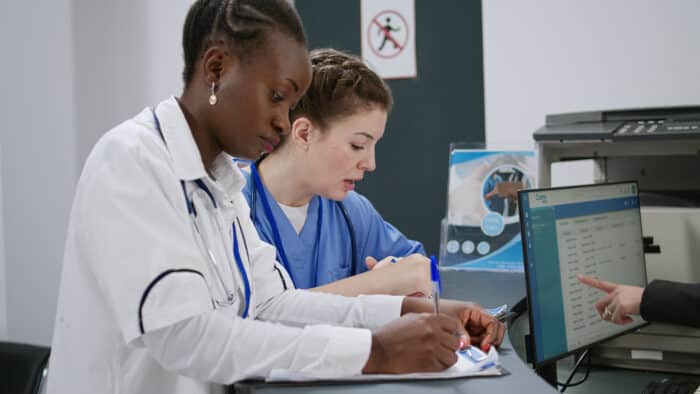Have you ever thought about a career in medical coding but felt overwhelmed by where to start?
You’re not alone!
Medical coding is an important part of the healthcare system, responsible for translating medical procedures and diagnoses into standardized codes that ensure accurate billing and record-keeping.
One of the best ways to break into this field is by getting your medical coding certification online.
Online certification programs offer a flexible, self-paced learning option that can fit around your busy life.
Whether you’re working full-time, managing family commitments, or just looking for a career change, online courses can provide the education you need without the hassle of commuting or rigid schedules.
In this article, we’ll discuss the ins and outs of obtaining a medical coding certification online. We’ll cover why online certification is a smart choice, what the process involves, and how you can get started.
Ready? Let’s dive in!
What is Medical Coding?
Let us first talk about what exactly medical coding is, and what these heroes do.
Medical coding is all about transforming detailed medical reports and descriptions of healthcare services into standardized codes.
These codes serve as a universal language that allows healthcare providers, insurance companies, and government agencies to communicate efficiently and process claims accurately.
So, what do medical coders do?
- Review patient medical records, including doctor’s notes, lab reports, diagnostic tests, and other documentation
- Analyze the information in the medical records to identify the appropriate diagnostic and procedural codes
- Assign specific codes using coding systems like ICD (International Classification of Diseases) for diagnoses and CPT (Current Procedural Terminology) for medical services and procedures
- Ensure that codes accurately reflect the patient’s diagnoses, treatments, and procedures
- Submit coded information to healthcare providers and insurance companies for billing and reimbursement purposes
- Collaborate with healthcare professionals, such as doctors and nurses, to clarify any ambiguities or discrepancies in medical records
- Conduct regular audits and quality checks to ensure coding accuracy and compliance with regulations
Also See: What is Medical Billing and Coding?
Medical Coding Certification
What is Medical Coding Certification?
Now, let’s walk you through medical coding certification and everything you need to know about it.
A medical coding certification is a credential awarded by professional organizations or accredited institutions to individuals who have demonstrated proficiency in medical coding through an examination process.
Some of the most common medical coding certifications include:
– Certified Professional Coder (CPC) from the American Academy of Professional Coders (AAPC)
– Certified Coding Specialist (CCS) from the American Health Information Management Association (AHIMA)
– Certified Coding Associate (CCA) from AHIMA
These certifications are nationally recognized and indicate that the holder has met certain standards of knowledge and expertise in medical coding.
Is Medical Coding Certificate and Certification the Same?
No! Even though they might sound similar, a medical coding certificate and a medical coding certification are completely different credentials.
Let us tell you how.
A medical coding certificate is typically awarded by educational institutions, such as community colleges, vocational schools, or online programs, upon completion of a training program in medical coding.
These programs provide instruction in medical terminology, anatomy, coding systems, and coding practices.
The main differences between a certification and a certificate are:
– Certification is obtained by passing a comprehensive exam administered by a professional organization, while a certificate is earned by completing a specific training program.
– Certifications are nationally recognized and often require continuing education to maintain, while certificates may or may not be as widely recognized or require ongoing education.
– Certifications generally have more stringent requirements, such as work experience or education prerequisites, than certificates.
Now that you know about the difference between a medical coding certificate and a medical coding certification, you might be wondering if it’s important to get both.
Well, to answer simply, yes, in addition to a certificate, a certification holds immense value in front of employers. It demonstrates your ability to handle the day-to-day tasks of medical coding, and how much knowledge you have.
Therefore, it is also important to ensure that the medical coding training program you choose ideally offers you both a certificate and a chance to prepare for the certification exams as well.
This is why Preppy’s Online Medical Coding Training Program is our favourite, since it offers both, and so many more perks!
So, let us introduce you to:
Preppy’s Online Medical Coding Training Program.
Here are all the reasons we find Preppy to be one of the best online training programs for Medical Coding.
- First, they’ve partnered with the prestigious Auburn University to bring you a top-notch education that’s recognized nationwide.
- And when you complete the program, you’ll walk away with a Certificate of Completion from Auburn itself. This will come in handy when you apply for those dream jobs.
But wait, there’s more!
- Preppy understands that money can be tight, so they’ve made their program highly affordable. No need to drown in student loans or beg for financial aid.
- Now, let’s talk convenience. This program is 100% online and self-paced, meaning you can study whenever and wherever you want – even in your PJs. No more rushing to beat traffic or scheduling your life around scheduled classes.
- Also, Preppy’s curriculum is designed to help you ace important certification exams like the CPC and the CCA from recognized authorities like AAPC and AHIMA.
- Unlike some programs that feel like they’ll never end, Preppy’s training can be completed in as little as four months. So you can land that dream job before you know it.
- Preppy hooks you up with externship opportunities, so you can get some real-world experience under your belt.
- Plus, they’ll even toss in a free laptop to make your online learning a breeze.
- And let’s not forget the support system. Preppy’s got your back with a dedicated Student Coordinator and 24/7 technical support. No more late-night panic attacks.
So, what are you waiting for?
Preppy’s Online Medical Coding Training Program is the total package – quality education, affordability, flexibility, and a pathway to certification success.
What Do These Certifications Involve?
If obtaining a medical coding certification has intrigued you, you might also be wondering what the process of certification involves.
We’re here to tell you exactly that.
A medical coding certification typically involves the following:
- Meeting Eligibility Requirements: Most certifying bodies have specific eligibility criteria that must be met before taking the certification exam. These may include educational requirements (e.g., completing an accredited medical coding program or having a certain level of academic qualification), work experience in medical coding or a related field, or a combination of both.
- Studying and Preparing: Candidates must thoroughly prepare for the certification exam by studying coding guidelines, medical terminology, anatomy, and other relevant topics. This may involve taking review courses, using study guides, or gaining practical experience through internships or employment.
- Applying for the Exam: Candidates must formally apply to the certifying organization, provide documentation to verify their eligibility, and pay the required fees.
- Taking the Certification Exam: The certification exam is typically a comprehensive, timed, and proctored test that assesses the candidate’s knowledge and skills in medical coding. The exam may be offered in a computer-based or paper-based format at designated testing centers.
- Meeting Scoring Requirements: Candidates must achieve a passing score on the exam, as determined by the certifying body, to earn the certification.
- Maintaining Certification: Most medical coding certifications require periodic renewal, typically every two years. Renewal may involve earning continuing education credits, retaking the certification exam, or a combination of both, to ensure that certified coders maintain their knowledge and skills.
So, it is evident that in order to sit for and pass the certification exams, getting formal medical coding training is important.
Medical Coding training is important for earning a professional medical coding certification. It provides the core knowledge in medical terminology, anatomy, coding systems, and guidelines that certification exams cover.
Many certifying bodies, like AAPC and AHIMA, require completing an approved educational program to even qualify for their exams.
These training programs offer coding exercises and practical experience to build essential skills – critical thinking, problem-solving, and attention to detail – which are essential for accurate medical coding.
While some certifications may allow qualifying based solely on experience, formal training ensures comprehensive prep for the certification exams. It demonstrates medical coders meet the necessary standards of competency.
Getting formal medical coding training is also important because:
- Comprehensive Knowledge: Formal training programs cover all the essential topics a medical coder needs to master, including medical terminology, anatomy, coding systems (ICD, CPT, etc.), and coding guidelines. This comprehensive knowledge is crucial for accurate coding.
- Hands-On Practice: Most training programs provide ample opportunities for hands-on coding practice using real-world scenarios and medical records. This practical experience is invaluable for developing coding skills.
- Instructor Guidance: Formal training offers access to experienced instructors who can guide students through complex coding concepts, provide feedback, and share industry insights.
- Exam Preparation: Reputable training programs are designed to prepare students for national certification exams, such as those offered by AAPC or AHIMA. They cover exam content and test-taking strategies.
- Eligibility for Certification: Many professional coding certifications require completing an approved formal training program as an eligibility criterion before taking the certification exam.
- Credibility: Employers often prefer to hire medical coders who have completed formal training, as it demonstrates a solid foundation and commitment to the profession.
What are the Benefits of Getting Certified as a Medical Coder?
Getting certified as a medical coder offers many benefits that can significantly enhance one’s career prospects and professional growth.
As we mentioned earlier, earning a medical coding certification demonstrates a high level of expertise, commitment, and credibility in the field.
It not only validates an individual’s coding knowledge and skills but also opens up opportunities for career advancement, higher earning potential, and increased job security. Certified medical coders are in high demand across various healthcare settings, and their credentials are widely recognized and respected by employers.
Here’s why getting certified is beneficial:
- Career Advancement: Certification can pave the way for promotions, leadership roles, or specialized positions within healthcare organizations, such as auditing, coding management, or training.
- Higher Earning Potential: Certified medical coders often command higher salaries compared to non-certified professionals, as their credentials signify advanced skills and expertise.
- Competitive Edge: In a competitive job market, certification can give candidates a distinct advantage over non-certified applicants, increasing their chances of securing desirable positions.
- Continuing Education: Most certifications require ongoing continuing education to maintain credentials, ensuring that certified coders stay up-to-date with the latest coding guidelines, regulations, and industry best practices.
- Professional Recognition: Certification demonstrates a commitment to professional development and adherence to ethical standards, earning respect from peers, healthcare providers, and employers.
- Job Security: As healthcare organizations demand accurate coding and billing practices, the demand for certified medical coders continues to grow, providing job stability and career longevity.
- Increased Confidence: The certification process and the knowledge gained instill a sense of confidence in one’s coding abilities, leading to improved job performance and decision-making.
Why Online Training Is Better
Online medical coding programs have emerged as a highly convenient and flexible option for formal training for many good reasons.
With the rise of remote work and increasing demand for skilled coders, online training provides a practical and accessible pathway to obtaining the necessary credentials for a rewarding career in medical coding.
They offer several advantages over traditional classroom courses:
- Flexibility: Study from anywhere with an internet connection – no need for a daily commute. This makes it easier to balance education with other responsibilities.
- Self-Paced Learning: Many online courses let you learn at your own pace, catering to individual needs. Spend more time on complex topics or accelerate through familiar material.
- Cost-Effective: Online programs are often more affordable, eliminating expenses like commuting, parking, and sometimes textbooks (with digital resources).
- 24/7 Access: Course materials and resources are available around the clock, allowing you to study whenever it’s most convenient for better review and reinforcement.
- Up-to-date Curriculum: Online programs frequently update their curricula, ensuring you learn the most current coding practices and standards.
- Variety of Resources: Enjoy a wealth of digital resources like videos, interactive lessons, quizzes, and e-books for enhanced learning experiences.
Conclusion
In conclusion, pursuing a medical coding certification online offers a flexible and accessible pathway to enter the healthcare industry.
With the growing demand for skilled medical coders, obtaining certification can significantly enhance career prospects and open up a range of job opportunities. Online programs provide the convenience of studying at your own pace while covering the essential knowledge and skills needed for the profession.
Related Resources:
Related Articles
-
How to Be Successful in College in 2022 – 7 Simple Tips to Succeed
-
How Do Scholarships Work? Read This First…Truth is Shocking
-
7 Best College Majors 2024: What Should I Major In?
-
How to Choose a College – 10 Things You Must Consider in 2024
-
Why Go to College? Top 13 Benefits for Adult Students in 2022
-
Top 5 Best Alternatives to Community College for 2024









